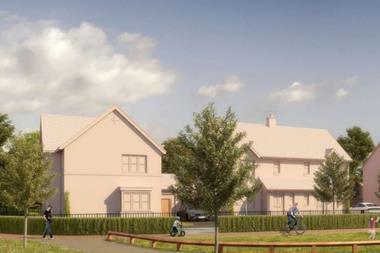In the latest episode of PropCast, two of the largest and most experienced real estate providers in life sciences real estate discuss their landmark new joint report, the regional growth in UK start-ups, and the flexibility of space that they need with founder and managing director of Blackstock Consulting, Andrew Teacher.
You can listen to this podcast via Apple Podcasts or Spotify or SoundCloud or listen to it through the player below:
With a background as a research scientist, Executive Director of We Are Pioneer Group’s (WAPG) Ventures business, Dr Glenn Crocker is no stranger to the lab bench and understands what start-ups and scale-ups need to commercialise discovery and ultimately grow.
Crocker, who was awarded an MBE in 2014 for his services to biotechnology, was responsible for developing BioCity Nottingham, now the UK’s largest bioscience innovation and incubation centre.
Chris Walters has an equally storied career, having become head of life sciences after ten years at JLL in 2021, specialising in the innovation and R&D sectors.
Life sciences is a white-hot sector that shows no signs of slowing down. A recent report co-authored by WAPG and JLL showed the number of UK life science start-ups increased by 24 percent between 2016 and 2020 to a total of 681, at almost double the rate of ten years ago.
But what sort of environment fosters such success? Crocker says that WAPG, the UK’s largest developer and operator of life science space, looks at more than just real estate data when considering the life sciences - including factors relating to attracting talent, regional specialisms and the quality of local academic research.
The WAPG boss also stresses the role of life sciences investors as “curators-in-chief” for early-stage companies. Central to WAPG’s business model is its vertically-integrated approach, by which it develops multi-tenanted facilities, curates an ecosystem with access to academia and capital providers, and runs UK-wide accelerator programmes.
Despite £20 billion in capital seeking a home in the sector and the proliferation of new start-ups, life sciences still faces key constraints on growth. The panel makes it clear that availability of lab space is a problem for life sciences research. “It’s a very supply starved market at the moment,” says Walters. “There’s no purpose built lab space being delivered in key markets like Oxford, Cambridge and London this year.”
A recent landmark report demonstrated the pressing need for extra lab space in the Oxford-Cambridge Arc and the pressures faced by the life sciences, as well as other science and technology research and development start-ups and spinouts. Against this backdrop of a lack of space, WAPG currently has a development pipeline in excess of 2 million sq. ft. to meet rising demand across the UK as a whole.
But the duo of experts discuss not only the traditional life sciences heartlands of the Oxford-Cambridge Arc or the Golden Triangle, but also the wide variety of real estate now available across new regions in the UK including the West Midlands and the South West. “Universities are obviously central to this sector,” says Crocker. “We have partnerships with a whole raft of institutions, hosting commercialisation workshops with postdocs interested in entrepreneurialism and taking them through the processes we use to develop and grow a company.”
Crocker points out the government has still got a lot of work to do on levelling-up, where life sciences and R&D have a huge role to play in spreading prosperity, as pointed out in the recent white paper. “If it’s going to invest more, it needs to invest in some of the other world-class university cities”, Crocker concludes.
You can listen to this podcast via Apple Podcasts or Spotify or SoundCloud or listen to it through the player above.





























No comments yet